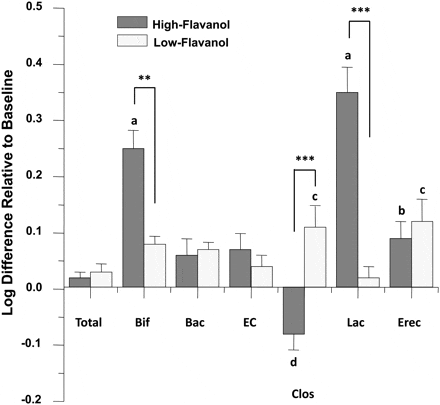- Joined
- Aug 24, 2017
- Messages
- 5,858
The first study is in pigs, where as little as 2.5g of cocoa powder had a beneficial affect on gut microbes. The second study is in humans, and they used cocoa flavonol instead of just cocoa powder, but the dose is achievable with 20g of cocoa powder daily. The Bifidobacterium species inhibit the growth of other pathogenic bacteria and also inhibits endotoxins. This effect of cocoa should lower gut irritation and serotonin, fix mobility issues, reduce fatigue, improve liver health, digestion, nutrients absorption, etc.
From this study: Flavanol-Enriched Cocoa Powder Alters the Intestinal Microbiota, Tissue and Fluid Metabolite Profiles, and Intestinal Gene Expression in Pigs
"Pigs were fed 2070 kcal/d supplemented with cocoa powder and/or dextrin and cellulose so that all pigs had the same intake of fiber (Supplemental Table 1). The 0-, 2.5-, 10-, and 20-g dose of cocoa powder contained 0, 51, 205, and 410 mg flavanols, respectively"
The cocoa powder enhances the abundance of Lactobacillus and Bifidobacterium species, reduces TLR2, 4 and 9 and also lowers TNFa.
"Compared with the unsupplemented pigs, the abundance of Lactobacillus species was greater in the feces (7-fold, P = 0.005) and that of Bifidobacterium species was greater in the proximal colon contents (9-fold, P = 0.01) in pigs fed only 20 or 10 g cocoa powder/d, respectively. Moreover, consumption of cocoa powder reduced TLR9 gene expression in ileal Peyer’s patches (67–80%, P < 0.05) and mesenteric lymph nodes (43–71%, P < 0.05) of pigs fed 2.5–20 g cocoa powder/d compared with pigs not supplemented with cocoa powder."
"Moreover, studies have shown that an increased abundance of Lactobacillus and Bifidobacterium can reduce bacterial pathogens by acidification of the intestinal contents (44), competition for receptors and adhesion molecules on epithelial cells (45), and production of antimicrobial compounds (46). Thus, the increase in cocoa-induced Lactobacillus and Bifidobacterium species would likely be associated with improved gut health."
From a human study: https://academic.oup.com/ajcn/article/93/1/62/4597700
"Compared with the consumption of the LCF (low–cocoa flavanol (LCF) group (23 mg cocoa flavanols/d)) drink, the daily consumption of the HCF (high–cocoa flavanol group (494 mg cocoa flavanols/d)) drink for 4 wk significantly increased the bifidobacterial (P < 0.01) and lactobacilli (P < 0.001) populations but significantly decreased clostridia counts (P < 0.001). These microbial changes were paralleled by significant reductions in plasma triacylglycerol (P < 0.05) and C-reactive protein (P < 0.05) concentrations."

Bif: Bifidobacterium
Bac: Bacteroides
EC: Escherichia coli
Clos: Clostridium histolyticum
Lac: Lactobacillus and Enterococcus
Erec: Eubacteriumrectale–Clostridium coccoides group
"Because the intervention drinks were matched for fiber amounts and did not contain any recognized prebiotic materials, this suggests that these changes in bacterial growth were mediated by cocoa flavanols."
From this study: Flavanol-Enriched Cocoa Powder Alters the Intestinal Microbiota, Tissue and Fluid Metabolite Profiles, and Intestinal Gene Expression in Pigs
"Pigs were fed 2070 kcal/d supplemented with cocoa powder and/or dextrin and cellulose so that all pigs had the same intake of fiber (Supplemental Table 1). The 0-, 2.5-, 10-, and 20-g dose of cocoa powder contained 0, 51, 205, and 410 mg flavanols, respectively"
The cocoa powder enhances the abundance of Lactobacillus and Bifidobacterium species, reduces TLR2, 4 and 9 and also lowers TNFa.
"Compared with the unsupplemented pigs, the abundance of Lactobacillus species was greater in the feces (7-fold, P = 0.005) and that of Bifidobacterium species was greater in the proximal colon contents (9-fold, P = 0.01) in pigs fed only 20 or 10 g cocoa powder/d, respectively. Moreover, consumption of cocoa powder reduced TLR9 gene expression in ileal Peyer’s patches (67–80%, P < 0.05) and mesenteric lymph nodes (43–71%, P < 0.05) of pigs fed 2.5–20 g cocoa powder/d compared with pigs not supplemented with cocoa powder."
"Moreover, studies have shown that an increased abundance of Lactobacillus and Bifidobacterium can reduce bacterial pathogens by acidification of the intestinal contents (44), competition for receptors and adhesion molecules on epithelial cells (45), and production of antimicrobial compounds (46). Thus, the increase in cocoa-induced Lactobacillus and Bifidobacterium species would likely be associated with improved gut health."
From a human study: https://academic.oup.com/ajcn/article/93/1/62/4597700
"Compared with the consumption of the LCF (low–cocoa flavanol (LCF) group (23 mg cocoa flavanols/d)) drink, the daily consumption of the HCF (high–cocoa flavanol group (494 mg cocoa flavanols/d)) drink for 4 wk significantly increased the bifidobacterial (P < 0.01) and lactobacilli (P < 0.001) populations but significantly decreased clostridia counts (P < 0.001). These microbial changes were paralleled by significant reductions in plasma triacylglycerol (P < 0.05) and C-reactive protein (P < 0.05) concentrations."

Bif: Bifidobacterium
Bac: Bacteroides
EC: Escherichia coli
Clos: Clostridium histolyticum
Lac: Lactobacillus and Enterococcus
Erec: Eubacteriumrectale–Clostridium coccoides group
"Because the intervention drinks were matched for fiber amounts and did not contain any recognized prebiotic materials, this suggests that these changes in bacterial growth were mediated by cocoa flavanols."
